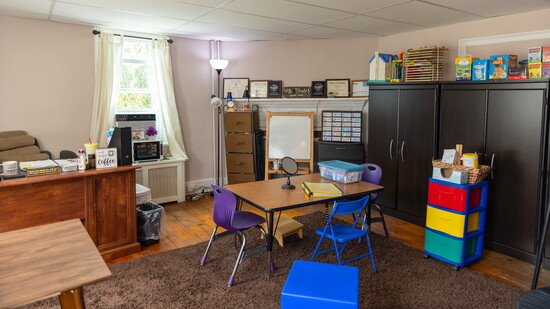Step into the Bayles Family Speech Center and it feels more like a living room than a clinic — by design. Founder Denise Bayles, a speech-language pathologist with 30 years of experience, builds care on warmth, trust and family partnership. “People need warmth. They need nurturing as well as quality therapy,” Bayles says. “I want families to feel this is a place where we build a strong trusting relationship.”
Gratitude runs through her work — gratitude for each small win, for parents who practice at home, and for voices that grow clearer week by week. “I was raised as a big family person,” Bayles says. “I bring that to the table and treat people like family.”
Therapy here includes the whole household. Parent coaching isn’t an add-on; it is in the plan. “There is not one session where I don’t do some kind of family training — during or at the end,” Bayles says. Caregivers leave with clear, doable strategies: how to expand a child’s one-word request into a two-word phrase, how to turn bath time into a language routine, how to wait for a response instead of answering for the child. “Families need to be able to work with their family members. That’s something I support and enhance,” she says.
Evidence-based and personal can coexist, Bayles adds. Licensed since 1995, she completes regular coursework in motor speech, post-frenectomy rehabilitation and updated oral-motor tools, and language development, along with required ethics, DEI and supervision credits. “You have to keep current, use research-based techniques, and still take in the whole child,” she says. She mentors high school, undergraduate and graduate observers, introducing them to family-centered care, and guest lectures when asked to help the next generation see what compassionate practice looks like in real rooms with real families.
What does a first therapy visit look like? Less pressure, more conversation, establishing rapport. Bayles reviews history and goals, watches how a child plays, and explains what she is seeing in plain language. Families leave knowing what to try at home that night — a game, a cue, a small change that builds momentum. “If they understand the why, they’re more likely to follow through,” she says.
She urges families to skip “wait and see.” “It’s antiquated,” Bayles says. Some examples of red flags include: missing developmental milestones, when caregivers understand less than half of a child’s speech, trouble following simple directions or weak chewing because the introduction of solids was delayed. “Muscles support speech development,” she says. “Get off the bottle by a year, pacifiers should be gone by around six months. Move to a straw cup so those muscles work correctly.” She recalls screening a child where multiple sounds were incorrect and she was not being understood at all. The family deferred services and Denise was recently told that same child is now struggling with learning to read. “If your child needs help, please get them help. Research shows that speech and language delay puts kids at a significant risk for deficits in reading, math, and language arts as they progress through school” she says.
Progress, she notes, begins in everyday moments. “Get off the screen. Put down the phones and tablets. Interact. Talk to each other,” Bayles says. A deck of picture cards, a favorite board game, folding laundry together — these are small, repeatable opportunities to model vocabulary, practice turn-taking and build confidence. “Language grows when we slow down long enough to hear each other,” she says.
To make guidance easier to access, Bayles is launching a small communication playgroup for three to four families at a time. “Kids can play and I answer parent questions and model activities,” she says. She is also planning to re-launch her online training video, “Help Me, Help My Kids” so caregivers can revisit techniques on demand. “I’ve found that video recording practice bits in sessions for the families, helps keep the practice going at home,” she says.
Looking ahead, her wish list is simple: faster referrals, fewer delays and sustainable roles for young clinicians. “I’d like parents to have a firmer understanding of the importance of speech therapy so we have fewer delays,” Bayles says. “And I hope the next generation of therapists is respected and able to find good jobs.”
This November, the center is celebrating the quiet victories: a first clear sound, a two-word phrase, a confident answer in class or at the dinner table. Families often share those wins in texts and videos; the team cheers along. “It’s better to get checked and gain peace of mind than miss a critical window,” Bayles says. “When families feel empowered, kids thrive — and that’s something to be grateful for.”
Bayles Family Speech Center
Address: 191 Church Rd, Bridgewater
Phone: (908) 578-0825
Website: baylesfamilyspeechcenter.com
